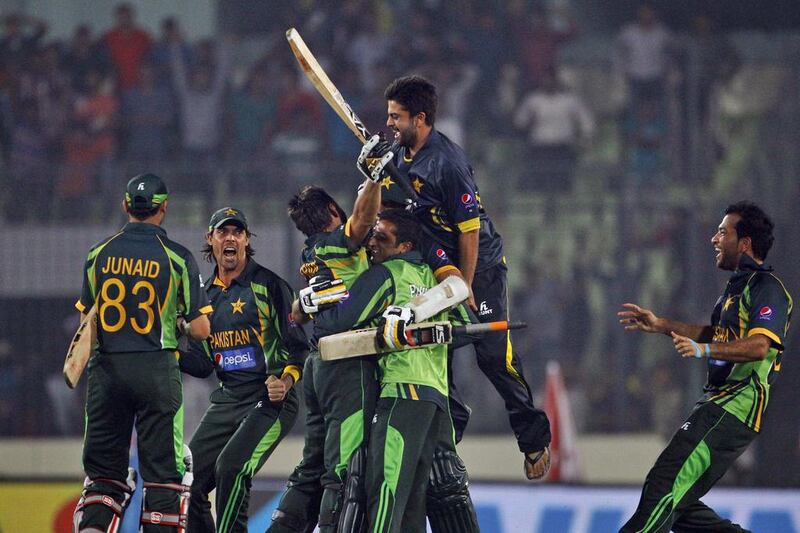Sixteen matches in over six years.
That is the trickle that we know currently as the India-Pakistan relationship on the field. This is not quite the detente of the ’60s and ’70s, when they did not play for 18 years.
Neither, however, is it the pragmatism of the ’80s and ’90s, where, despite going periods without regular tours, they found ways of maintaining bilateral ties around the world.
Last night as they faced off again at the Asia Cup in Mirpur, it was easy to wonder exactly what kind of relationship phase they are in at the moment.
Let us first acknowledge there is nothing in cricket like this. That much was evident in Pakistan's one-wicket win. Every ball in cricket has its own little story, but in India-Pakistan matches, each one heaves with so much more drama.
Every little ball, each act, is full-term pregnant with consequences. Potentially each one is a book, a movie, a career and a life all on its own.
On Sunday there was the whole gamut: a dropped catch, a missed stumping, incorrect umpiring decisions, certain boundaries prevented at the last gasp.
With each act, the match swung. Sunday night was ridiculous in perfectly encapsulating what cannot ever be actually and fully encapsulated.
It was most ridiculous in remaining perched on the thinnest edge until the very end.
Even as Shahid Afridi hit those last two balls for sixes, even as they were mis-hit and soared high, the match crept further to a tip that minutes before did not even exist.
Plenty of those Afridi hits have landed in a fielder’s hands. Maybe with bigger boundaries, they still would have.
They did not, but had they, we still would have had another indelible memory in our store that houses these contests.
These match narratives are not unique in and of themselves. Cricket throws them up fairly regularly.
But, in these contests, the narratives are more intense, sometimes darker, more petulant – but always so much more.
So, India-Pakistan remains a rivalry primarily because an absence of contests does not easily erase an entire history.
Additionally, all the games, other than the limited-overs tour Pakistan undertook in late 2012, have been one-off contests in high-profile tournaments.
Usually prolonged participation in the tournament has been at stake, so that the unique edge and tension that constitutes a rivalry has remained and the Asia Cup would be even more irrelevant but for an India-Pakistan match.
If anything, that has sharpened its nature, even if it can be convincingly argued that India-Pakistan contests might do better without necessarily carrying higher stakes.
There is no longer even the regular, defanging neutrality of Sharjah or Toronto to cool those things down.
But it is also not a rivalry in any real sense of the word. Rivalries require familiarity and a certain degree of regularity.
They need sustenance.
Right now we are reduced to relying on organisers such as the International Cricket Council (ICC) finding ways to ensure they meet at least once in every ICC tournament.
So much has happened since the last time these two had regular bilateral interaction that it feels like it should constitute a new history.
A fresh generation of players has emerged on both sides. India has conquered the world and lost it, too.
Pakistan never had the world, but has lost its way spectacularly in it. It needs reminding that today, the morning after, marks half a decade since Pakistan effectively lost the right to host home matches.
Actually, forget six years. Much has happened in the last two months alone that compels a resumption.
The BCCI, and the boards of England and Australia, have aligned to form a new world order. In that world, Pakistan is untethered, drifting as one of the smaller boards in a sea of irrelevance.
Like every other board, they need the BCCI and matches with India. Over the last six years, the Pakistan Cricket Board (PCB) has been chasing the BCCI for matches. The BCCI has not been keen.
Unlike every other board, the PCB has not yet signed onto the new world governance. Their official approval would be nice, but it is not necessary, so as far as bargaining chips go, the PCB does not have a particularly strong one.
Carrots have been dangled their way, but nothing would help dispel fears of how cricket now goes than the BCCI signing on for at least one full series with the PCB. They do not need to play Pakistan. Financially, the BCCI has enough eggs in enough baskets to live and profit without it.
But as last night proved, as any number of their recent games have underscored time and again, cricket needs a full renewal of an unmatched rivalry.
osamiuddin@thenational.ae
Follow us on Twitter at SprtNationalUAE





